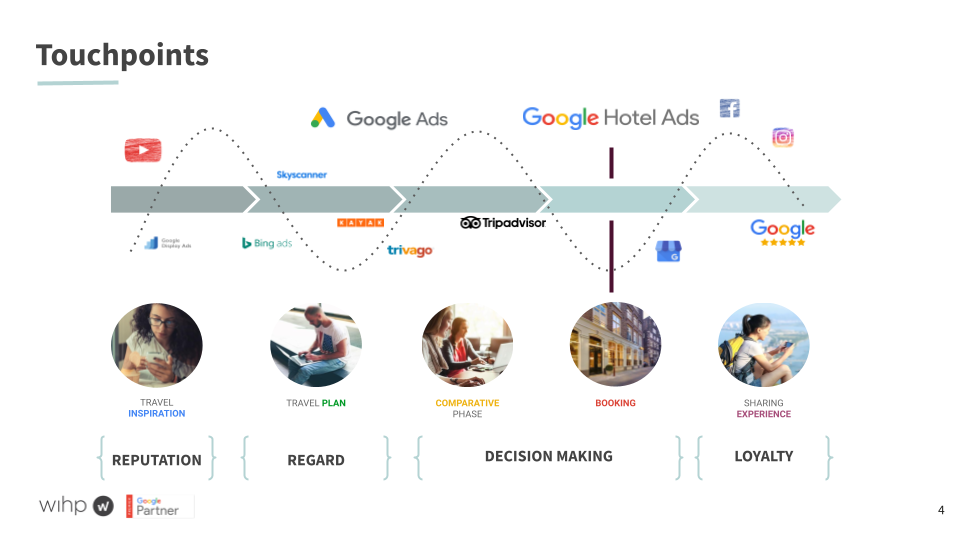
The 5 fundamentals of hotel marketing

How can you increase your direct bookings?
This is the question that all hotel directors, sales managers and marketing managers ask themselves when it comes to optimizing distribution costs for their hotel.
Indeed, “opening the floodgates” for OTAs to distribute your hotel isn’t the most sustainable solution if you want to control both distribution and costs.
Therefore it’s important to set up effective marketing actions for your hotel that allow you to increase your direct bookings and reduce sales costs.
1. Search Marketing
Search Engine Advertising, more commonly referred to as SEA or Google Ads involves advertising on search engines.
You bid on selected keywords to make your website appear towards the top of the results on Google or another search engine (e.g. Bing, Yahoo, etc.).
The main strategies are:
Visibility strategy: You buy generic keywords like Hotel + “destination”; Hotel + “city”, etc.
This allows you to increase your volume of traffic for an audience interested in the city or destination you are located in.
Brand protection strategy: You buy keywords related to your property name and/or brand to reach a qualified audience that is of interest to your hotel or brand. You’ll maximise your direct bookings and get a high return on your investment in addition to preventing third parties from grabbing qualified traffic.
2. SEO
SEO or natural referencing is part of the hotel marketing mix. SEO is a technique that helps to position a website towards the top of search results.
It can be categorized into two types:
– SEO on your brand name or product name (the name of your hotel),
– Long tail, which allows you to work on a selection of keywords.
SEO on your brand name is essential. To capture qualified traffic looking for your hotel, you must naturally be the top result when internet users search for your hotel.
Long tail SEO allows you to fetch traffic from broader searches: you’ll capture traffic interested in your destination and/or service.
3. Metasearch Marketing
Advertising on price comparison sites (Google Hotel Ads, Trivago, Tripadvisor, etc.) allows you to capture highly qualified traffic in the sense that your advertising campaigns are displayed on your hotel’s page.
Internet users visit these websites for several reasons: hotel reviews, services, photos and also to make sure they get the best deal when booking your hotel.
Your official website must become a trusted reference for internet users. By displaying your prices live, you will increase your turnover by reducing the margin taken by OTAs. It’s worth noting that direct bookings are faster and easier to measure.
Who are the main players in the sector? The main price comparison sites like Google Hotel Ads, Tripadvisor, Trivago, Kayak, Skyscanner, Wego, Hotel Combined, Bing Ads etc.
4. Display Ads
This is about carrying out poster campaigns on online advertising spaces.
These spaces are available on many websites often grouped into networks. Display Ads allow you to display banners advertising your hotel or your rooms on those different websites.
You can select when and how and for who your banners will be displayed to internet users. There is a vast array of options and depending on your objectives, several strategies can be put in place.
Who are the main players? For display ads, it’s search engines like Google, Bing or Yahoo.
5. Social Media Marketing
Social Media Marketing is the act of advertising through social networks.
They play an important role in internet use. SMM allows you to target internet users very precisely based on demographic and sociological data (age, sex, consumption habits, passion, etc.).
You can also use social media as a remarketing tool, targeting only people who have already had an interaction with your brand or hotel.
Today, the main players for the hospitality industry are Facebook and Instagram.
How does digital marketing fit into an internet user’s booking journey?

An internet user goes through different stages:
Reflection: At this stage, the traveller is still in the research phase. This is when you can activate search marketing or display ads. You’ll reach travelers who are looking for their next trip.
Research: During the research phase, the traveller already has an idea of where they want to go for their next trip. Clever bidding can help your business appear at the top of search results.
Comparison: Here, the traveller will compare the prices of the different hotels. They’ll probably use a metasearch engine, which is why your presence on this channel with the right price is important.
Reservation: If the traveller did not book their trip directly during the comparison phase, now is the time to encourage them to finalize their booking. Using advertising banners, you will be able to reappear at the appropriate time and in doing so redirect them to your website.
With hotel marketing, you can reach travelers at different stages of their booking journey. The key to a successful strategy is that all the actions you take work together.
Want to set up a marketing strategy for your hotel? Our team is available to guide you.